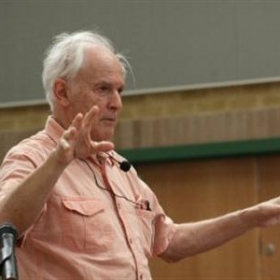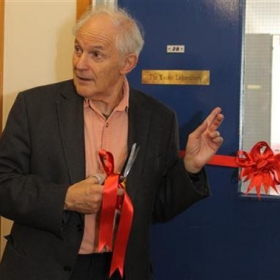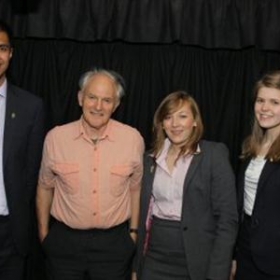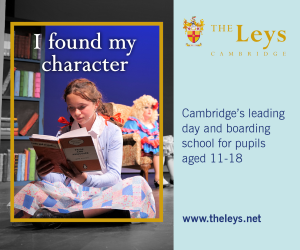Nobel prize winner names laboratory
Published on isbi School News dated Monday 30th of September 2013
Leading scientist Sir Harry Kroto, who won the Nobel Prize in chemistry in 1996, made a rare visit to his birthplace when he addressed students at Wisbech Grammar School and gave his name to a laboratory.Professor Kroto's parents were born in Berlin, but came to Great Britain in the 1930s as refugees from the Nazis because his father was Jewish. As a baby, Harry Kroto lived in Wisbech for the first five months of his life and made a brief return visit to the town about 30 years ago.
In the 1980s he launched a research programme at the University of Sussex, where he now holds an emeritus professorship, to look for carbon chains in the interstellar medium and his group found evidence of longer chain molecules.
Trying to explain them led to the discovery of the C60 molecule, Buckminsterfullerene, which is also known as 'buckyball', and Sir Harry suggested that Richard Smalley and Robert Curl at Rice University in Texas, who went on to share the Nobel Prize with him, should simulate the carbon chemistry that occurs in the atmosphere of a carbon star.
The experiment not only proved that carbon stars could produce the chains, but revealed the existence of the C60 species. Until this point chemists believed that diamond and graphite were the only two forms of carbon and now Kroto had discovered a third structure C60.
The Francis Eppes professor of chemistry at the Florida State University, wearing an open-necked shirt and shaking the hands of as many pupils as he could reach in the packed audience, said that the point of school was to prepare the mind to be creative and that the secret of success was refusing to give up.
In a multi-disciplinary address to the whole school, the Nobel prize winner showed an image of him acting with his contemporary, Sir Ian McKellen who wrote an introduction for the Grammar School's 'Amadeus' in 2009 in a production of Shakespeare's 'Henry V' at Bolton School. An art editor of the student magazine at the University of Sheffield, the professor added that it was important to be able to show that you have a wide range of interests when you apply for a job.
He argued that at school students should learn to try to make decisions without taking anything from other people
He said: 'We want everybody to be educated so they don't need to be led by politicians and others who are just idiots. The ethical purpose of education must involve teaching our young people how they can decide what they are being told is true.'
During his visit he gave his name to a refurbished chemistry laboratory at the school and in a separate address to lower sixth form scientists he talked about his discovery of C60, taking questions from the audience, and asked the students to become involved in his project, GEOSET, which helps people to communicate their ideas to a wider audience.
Headmaster Nicholas Hammond said: 'We were absolutely delighted to welcome Sir Harry Kroto to Wisbech Grammar School. He proved an inspirational speaker whose ideas will stay for a long time with the pupils who heard him.'










